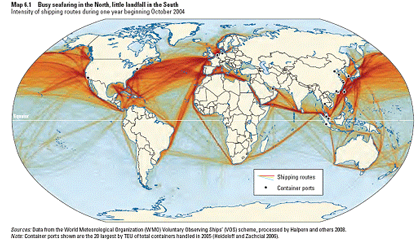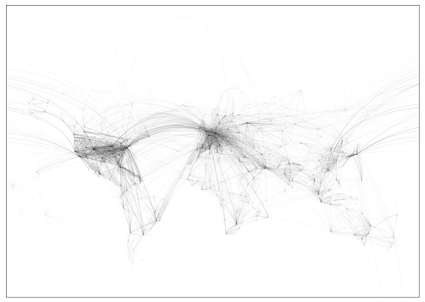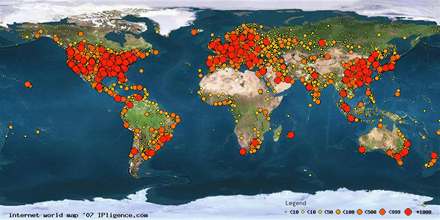Africa desperately needs trade links: a pictorial essay
In all the debates about free trade, we can forget sometimes that international trade is not optional for a very small, very poor country. If there are any kinds of returns to scale at all in many sectors, and casual observation and much research suggests there are, then a tiny domestic market will rule out any serious domestic production in many, many sectors (is the Gambia going to be making refrigerators any time soon?) So trade will be a necessity, specializing in what each small, poor country can do, and importing everything else. And what continent is full of small, poor countries? Africa, of course. Then it’s all the more distressing that Africa does not have much in the way of trade links – shipping routes, air connections, Internet connections (for both communication and moving goods) – with the global economy. This is best seen in a series of pictures.
Lack of shipping routes going to Africa (except South Africa and Nigerian Oil):

Click here for a larger image.
Source: the excellent 2009 WDR “Reshaping Economic Geography” of the World Bank, Chapter 6
Scarcity of Airline Routes to Africa compared to rest of World (except South Africa):
Scarcity of Internet Connections except South Africa (map of # of IP addresses in 2007):
In short, Africa is disconnected from the global economy, which is very bad news for a continent that desperately needs international trade (the disconnection is both symptom and cause of the lack of trade). Lack of international trade = poverty for small economies.
This lack of trade links reflects many factors: rich country protectionism, domestic policies on customs & tariffs & foreign investment, poor port and road infrastructure, thus very high land transport costs within Africa, barriers crossing borders within Africa, Africa stereotypes that discourage foreign investors and out-sourcers, and so on.
There is some hope on the horizon for the Internet and communications issues, at least. High-speed fiber optic cables are connecting the east and west coasts of Africa to the rest of the world. And we all know about the famous cell phone revolution happening within Africa. Comparative advantage reflects your infrastructure quality and transport costs as well as your other endowments and experience. Perhaps the new broadband Internet connections will make possible all kinds of new businesses that economize on physical transport and use the Internet and cell phones instead. How about some kind of e-Africa.com, ready to open for business?
 From Aid to Equality
From Aid to Equality


